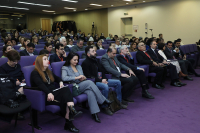RA ESCS Minister Zhanna Andreasyan participated today in the Conference “Armenia’s National Research and Innovation System: Transforming Challenges into Revival”, which was held by the “Gituzh” Initiative.
Deputy Chairman of the National Assembly Hakob Arshakyan and Minister of High-Tech Industry Robert Khachatryan also attended the Conference.
The Conference has brought together representatives of the scientific, educational and technological community and the public sector on one platform to discuss the prospects for the development of Armenia's scientific, technological and innovation system, obstacles on this path and their solutions, as well as to understand how to make science a priority tool for ensuring security and increasing the competitiveness of Armenia.
ESCS Minister Zhanna Andreasyan welcomed the initiative and emphasized its significance in terms of ensuring participation and discussion of existing issues in the sector and their solutions in an inclusive environment, voicing various opinions. Zhanna Andreasyan touched upon the priorities in the field of science: “The Government has established specific and measurable objectives for funding the science sector, revitalizing the scientific community, fostering generational change, attracting new scientists, validating results, and advancing technological progress. Over the past 3 years, the Government has made significant investments in the field of science, and there is a need to understand the indicators of the efficiency of these investments, intermediate results and their measurability so that our next steps are more thoughtful and more accountable in terms of outcomes. It is important to understand the expectations of the society, the economy, and the scientific community from the field of science. Our task is to also develop the link between the outcomes of science and economy.”
ESCS Minister Zhanna Andreasyan emphasized that funding for the science sector has already increased by over 150%, which is 2.5 times more as compared to 2018, reaching more than 30 billion, resulting in noticeable changes.
“There was a rise in the number of scientists last year: over 70% of the grants awarded through our programs go to young scientists who are under 35. Starting from January 2024, scientists' salary will increase by almost 170%. These processes are also facilitated by the provision of technical equipment. Last year, a total of 28 scientific devices were purchased, amounting to approximately 2.9 billion AMD. There are even devices worth $ 1 million that enable to conduct serious and relevant research. This year applications for the acquisition of equipment were received within $4.2 billion and procurement procedures are being set up,” stated the Minister.
Zhanna Andreasyan discussed the significance of social sciences as well: “The ESCS Ministry prioritizes not only natural and mathematical sciences but also social sciences for scientific advancement. We are living in extremely challenging times and are witnessing a complete restructuring of the world order that we are accustomed to, and social science is playing a significant role in this.”
The Deputy Chairman of the National Assembly Hakob Arshakyan informed the Conference participants that it was proposed to establish a supercomputing artificial intelligence centre worth $8 million in Armenia as part of the 2024 budget application. The subject will be considered at the upcoming Government session.
HTI Minister Robert Khachatryan, stressed the need to train specialists in accordance with labour market demands: “We are working to put all of the suggestions into practice with the help of ongoing and new initiatives that include both educational and scientific components. They are aimed at the advancement of science, education, high technology and economy.”
Chairman of the Board of Trustees of the “AYB” Educational Foundation Aram Pakhchanyan, in turn, highlighted: “Science is becoming a methodical and structured field rather than a subject for individuals. Changes are occurring both globally and in Armenia, encompassing not only social but also technological aspects. Humanity has always found a way out of a complex reality, which was also a risky path, and scientists became the pioneers of this journey.”
During the Conference, several topics related to the scientific potential available in universities and institutes and the requirements of the future were considered, including the scientific potential in universities and institutes, future requirements, the need for a research-oriented educational environment, the promotion of humanities and social sciences in Armenia, and the commercialization of science.
The Conference is held through 8 panel discussions in the field of science. The “Gituzh” initiative's progress, accomplishments, and future plans were summarized.










